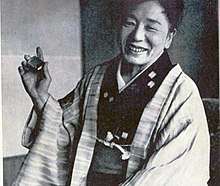Yoko Mizuki
Yoko Mizuki (水木 洋子, Mizuki Yōko, 26 August 1910 – 8 April 2003) was a Japanese screenwriter. Born in Tokyo, she later graduated from Bunka Gakuin and began writing screenplays to support her family after her father died. Mizuki was active in the 1950s era of the Japanese studio system and is notable for her work with directors Tadashi Imai and Mikio Naruse.[1][2] Her work had received several Best Screenplay Awards from Kinema Junpo and has been described in the book Women Screenwriters: An International Guide as "One of the most important and accomplished Japanese female screenwriters of all time".[1]
Yoko Mizuki | |
|---|---|
 Mizuki in 1966 | |
| Born | August 26, 1910 Tokyo, Japan |
| Died | April 8, 2003 (aged 92) Ichikawa, Chiba, Japan |
| Occupation | Screenwriter |
| Years active | 1936–93 |
| Spouse(s) | Senkichi Taniguchi |
Biography
Yoko Mizuki was born under the name Tomiko Takagi on 26 August 1910 in Tokyo.[2] Mizuki later graduated from Bunka Gakuin and began acting at the Tokyo Left-Wing Theater (Tokyo Sayoku Gekijo).[2] Nelmes father died, which led to her supporting her family by writing stage plays at the age of 23.[2] During World War II, Mizuki wrote radio dramas.[2]
Inspired by her Russian teacher Toshio Yasumi, she began screenwriting.[2] Her first script was The Life of a Woman (1949) with was co-written with Yasumi.[2] The film involves a pregnant woman who works in printing plant under poor conditions.[2] Her second screenplay for Until We Meet Again (1950) brought her acclaim and began her collaborations with director Tadashi Imai.[2] Despite the praise for the film from Kinema Junpo, Mizuki claims that she was still struggling to write screenplays and had to re-write much of Until We Meet Again while it was filming.[2]
Mizuki wrote the screenplay for The Story of Pure Love which won the Silver Bear at the Berlin International Film Festival .[3] She also wrote unconventional topics for screenplays such as Kiku and Isamu (1959), a story about two mixed-race children in Okinawa.[3] She was later awarded the Kinema Junpo awards for Best Screenplay for her work for These Are Harbour Lights (1961), The Age of Marriage (1961), Sweet Sweat and Kwaidan.[3][4]
In her later career, Mizuki worked extensively for television, with her credits including Ryoma Forever (1968) for the Japanese Broadcasting Corporation (NHK).[3][5] Mizuki died on 8 April 2003 in Ichikawa, Chiba.[5] Her former home was turned into the Mizuki Memorial Museum.[5]
Personal life
Before World War II, Mizuki was briefly married to director and screenwriter Senkichi Taniguchi who often collaborated with Akira Kurosawa.[2]
Among her own 34 screen credits, Mizuki's favourite of films of her own works were Until We Meet Again, The Story of Pure Love, Kiku and Isamu and The Age of Marriage[3]
Partial filmography
- The Life of a Woman (1949)
- Until We Meet Again (1950)
- Muddy Waters (1953)
- Floating Clouds (1955)
- Night School (1956)[6]
- Kiku and Isamu (1959)
- The Age of Marriage (1961)
- Sweet Sweat (1964)
- Kwaidan (1965)
References
Footnotes
- Nelmes & Selbo 2015, p. 116.
- Nelmes & Selbo 2015, p. 117.
- Nelmes & Selbo 2015, p. 118.
- Galbraith IV 2008, p. 213.
- Nelmes & Selbo 2015, p. 119.
- Ryfle & Godziszewski 2017, p. 121.
Sources
- Galbraith IV, Stuart (2008). The Toho Studios Story: A History and Complete Filmography. Scarecrow Press. ISBN 1461673747.CS1 maint: ref=harv (link)
- Nelmes, Jill; Selbo, Jule, eds. (2015). Women Screenwriters: An International Guide. Springer. ISBN 1137312378.CS1 maint: ref=harv (link)
- Ryfle, Steve; Godziszewski, Ed (2017). Ishiro Honda: A Life in Film, from Godzilla to Kurosawa. Wesleyan University Press. ISBN 0819577413.CS1 maint: ref=harv (link)
External links
- Yoko Mizuki on IMDb